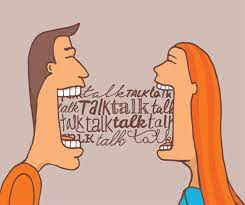I have a recurring nightmare in which I end up stuck in some endless conversation at a party or a networking event. I want to make my escape but can’t get out of the head-grip I feel I’m in with the other person.
It seems I’m not alone. Scientists have recently investigated both sides of this coin: the trapper and the trappee. What if both people are thinking exactly the same thing, but are both stuck because they can’t move on when they’re really done?
A study published on 9th March in the Proceedings of the National Academy of Sciences USA reports on what researchers discovered when they climbed into the heads of talkers to gauge their feelings about how long a particular conversation should last. The team found that conversations almost never end when both parties want them to—and that people are a very poor judge of when their partner wishes to call it quits. In some cases, however, people were dissatisfied not because the talk went on for too long but because it was too short.
 The research suggests that whatever you think the other person wants, you may well be wrong. The answer seems to be to leave at the first time it seems appropriate, because it’s better to be left wanting more than less.
The research suggests that whatever you think the other person wants, you may well be wrong. The answer seems to be to leave at the first time it seems appropriate, because it’s better to be left wanting more than less.
Most past research about conversations has been conducted by linguists or sociologists. Psychologists who have studied conversations, on the other hand, have mostly used the research as a means of addressing other things, such as how people use words to persuade. A few studies have explored what phrases individuals say at the ends of conversations, but the focus has not been on when people choose to say them. Psychology seems to be waking up to the fact that this is an interesting and fundamental social behaviour.
Researcher Adam Mastroanni and his colleagues undertook two experiments to examine the dynamics of talk. In the first, they quizzed 806 online participants about the duration of their most recent conversation. Most of them had taken place with a significant other, family member or friend. The individuals involved detailed whether there was a point in the conversation at which they wanted it to end and estimated when that was in relation to when the conversation actually ended.
 In the second experiment, held in the lab, the researchers split 252 participants into pairs of strangers and instructed them to talk about whatever they liked for anywhere from one to 45 minutes. Afterward the team asked the subjects when they would have liked the conversation to have ended and to guess about their partner’s answer to the same question.
In the second experiment, held in the lab, the researchers split 252 participants into pairs of strangers and instructed them to talk about whatever they liked for anywhere from one to 45 minutes. Afterward the team asked the subjects when they would have liked the conversation to have ended and to guess about their partner’s answer to the same question.
Mastroianni and his colleagues found that only 2 percent of conversations ended at the time both parties desired, and only 30 percent of them finished when one of the pair wanted them to. In about half of the conversations, both people wanted to talk less, but their cutoff point was usually different. Participants in both studies reported, on average, that the desired length of their conversation was about half of its actual length. To the researchers’ surprise, they also found that it is not always the case that people are held hostage by talks: In 10 percent of conversations, both study participants wished their exchange had lasted longer. And in about 31 percent of the interactions between strangers, at least one of the two wanted to continue.
Most people also failed at intuiting their partner’s desires. When participants guessed at when their partner had wanted to stop talking, they were off by about 64 percent of the total conversation length!
 That people fail so completely in judging when a conversation partner wishes to wrap things up is quite astounding. Conversations are normally an elegant expression of mutual coordination. And yet it all falls apart at the end because we just can’t figure out when to stop. This puzzle is probably one reason why people like to have talks over coffee, drinks or a meal, because the empty coffee cup or asking for the bill gives us an excuse which is a critical conversation-ending crutch.
That people fail so completely in judging when a conversation partner wishes to wrap things up is quite astounding. Conversations are normally an elegant expression of mutual coordination. And yet it all falls apart at the end because we just can’t figure out when to stop. This puzzle is probably one reason why people like to have talks over coffee, drinks or a meal, because the empty coffee cup or asking for the bill gives us an excuse which is a critical conversation-ending crutch.
Nicholas Epley, a behavioural scientist at the University of Chicago, who was not on the research team, wonders what would happen if most conversations ended exactly when we wanted them to. How many new insights, novel perspectives or interesting facts of life have we missed because we avoided a longer or deeper conversation that we might have had with another person?
 While this cannot be determined in the countless exchanges of everyday life, scientists could feasibly design an experiment in which talks either end at precisely the point when a participant first wants to stop or continue for some point beyond. Do those whose conversations end just when they want them to actually end up with better conversations than those that last longer?
While this cannot be determined in the countless exchanges of everyday life, scientists could feasibly design an experiment in which talks either end at precisely the point when a participant first wants to stop or continue for some point beyond. Do those whose conversations end just when they want them to actually end up with better conversations than those that last longer?
The findings also open up many other questions. Are the rules of conversation clearer in other cultures? Which cues, if any, do expert conversationalists pick up on? What about the dynamics of group chats?
 The burgeoning science of conversation obviously needs more rigorous research, but it also needs causal experiments to test strategies that might help us navigate the important and pervasive challenges of conversation. It tickles me that we can put rovers on Mars, have amazing scientific breakthroughs and yet we’re just beginning to rigorously understand how we, as people, talk to each other!!
The burgeoning science of conversation obviously needs more rigorous research, but it also needs causal experiments to test strategies that might help us navigate the important and pervasive challenges of conversation. It tickles me that we can put rovers on Mars, have amazing scientific breakthroughs and yet we’re just beginning to rigorously understand how we, as people, talk to each other!!
REFERENCES:
Do conversations end when people want them to? Adam M. Mastroianni, Daniel T. Gilbert, Gus Cooney, and Timothy D. Wilson. Proceedings of the National Academy of Sciences USA, March 9, 2021 118 (10) e2011809118; https://doi.org/10.1073/pnas.2011809118
